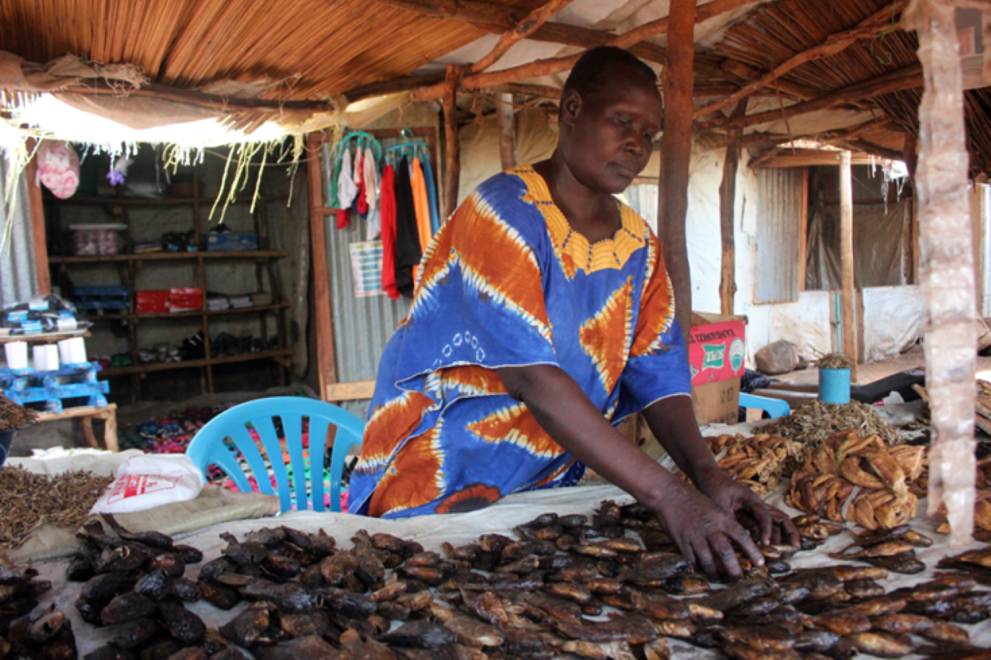
In Uganda, the “Response to Increased Demand on Government Services and Creation of Economic Opportunities (RISE)” project supports farmer groups through the Village Saving and Loans Associations (VSLA) approach to enable greater resilience and self-reliance among both refugee and host communities.
Learning how to farm for personal income
Like most rural women, Betty Lalam had business ideas. However, being a refugee with no sustainable income and security, since fleeing South Sudan in 2017, she was constrained. She had no source of start-up income for any business. In 2019, Betty learned about the EUTF RISE project that was mobilizing refugees and host community members to engage them in agricultural activities for personal income. It is then that Betty joined a group named “Aliodrozu” in Yellulu village (Terego District). “Aliodrozu” translates to “chase poverty” in the Lugbara Language. The group comprises 25 members, both refugees, and host community members. Via the group, she received onion seedlings, two goats, groundnuts, a tarpaulin and, a watering can, a facemask, a bar of soap. She also learned how to grow onions and manage them.
Jenifer Dudu also benefitted from the support of the RISE project. The 50-year-old single parent did not always have it easy when she arrived in Uganda in 2016. But with nine children in her care, Jennifer was determined to change this narrative: she started a fish vending business in Ofua 3 Market, Rhino camp Refugee settlement. She bought meager quantities of fish and got herself a slot on the market floor from where she traded. In 2019, she joined the Pipile saving group. Members of her group received inputs from the RISE project including onions, goats, and groundnuts. Following training in good agricultural practices, Jennifer planted less than half an acre of onions and managed to harvest three basins of onions, and on one quarter-acre she harvested one bag of groundnuts. “I decided to process my groundnuts into paste since fish goes well with groundnuts paste and also paste fetches me more money” explains Jennifer.
Using savings to invest for the future
As members of their savings groups, Betty and Jenifer could borrow money to supplement their needs.
With income from farming trickling in, Jennifer consistently made savings contributions to her group and therefore qualified to obtain loans that she used to grow her fish business. Jennifer managed to buy a stall in the market. She now buys fish in much larger quantities and has acquired extra shop space where she sells mixed goods including plastic sandals, books, and general merchandise. She also rented an additional store from which she earns rent.
Betty also requested a loan from her group. She borrowed 150,000 UGX (35€) with which she bought beads and threads to start a crafts business. Her crafts business, though small, enabled her to earn a regular income to make contributions to the savings group and repay her loan. From her onion garden, Betty harvested five basins of onions from which she earned 175,000 UGX (40€). She saved part of this income with her group and bought more materials for her crafts business. She also got another loan and bought two more goats. Within one year, her craft business has grown to a net worth of one million UGX (230€) as she now gets larger crafts orders and sells at the weekly community markets within the rhino camp refugee settlement. From her saving group annual saving share- out, Betty earned 800,000 UGX (184€). She plans to use part of her money to pay school fees for her son in Senior three in Arua, rent more land, buy two more goats and some seeds. “I plan to focus on crafts because the crafts business is self-sustaining. I am also going to rent more land and venture in rice growing” explains Betty.
More on the RISE Project
The RISE project is co-funded by the EU and BMZ and implemented by GIZ. The project's agricultural component helps to initiate and support VSLAs to save weekly and make investments. At the beginning of every saving cycle, group members are encouraged to invest to improve their livelihoods. They also set annual investment targets.
Details
- Publication date
- 23 June 2021
- Region and Country
- Uganda
- Thematic
- Greater economic and employment opportunities
- Partner
- GIZ
- CARE
